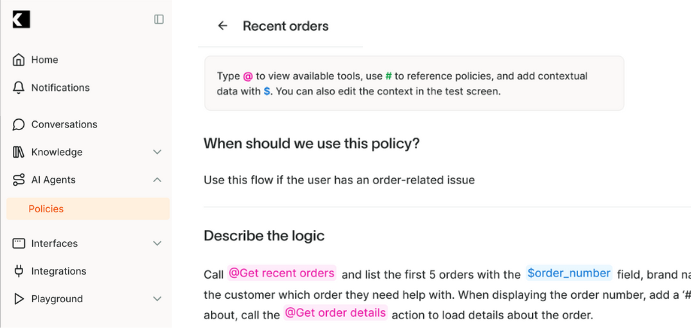Ingredients
Returnly, Salesforce Service Cloud, and Kodif.
What are AI Policies?

At Kodif, we’re excited to announce the launch of Policies—a powerful, dynamic solution designed to revolutionize the way CX managers handle customer support. Unlike traditional flows, which are rigid and complex, Policies empower non-technical users to create and manage customer interactions with ease. Written in natural language, Policies make it simple to define and refine customer experiences without needing to rely on complicated flowcharts or scripting. This approach is not only user-friendly but also self-serve, enabling CX teams to quickly translate existing Standard Operating Procedures (SOPs) into automation, saving valuable time and resources.
The flexibility of Kodif Policies ensures that businesses can offer personalized, context-driven support while continuously improving customer experiences. With Policies, you can experiment with different strategies to optimize outcomes such as CSAT, revenue, and retention—all without the need to rebuild complex workflows. Whether it’s automating routine interactions or testing new approaches for high-stakes scenarios, Policies provide a scalable, adaptable solution that aligns with your business goals. While flows still have their place in sensitive, high-risk situations, Policies offer an agile alternative that helps businesses innovate faster and deliver exceptional, tailored experiences at scale.
“Return order for refund or replacement” ticket type explained
In customer support, “Return order for refund or replacement” refers to handling requests where customers wish to return purchased products due to various reasons such as defects, dissatisfaction, or incorrect items received. This process involves verifying the eligibility of the return, initiating the refund or replacement procedure, and ensuring customer satisfaction by providing timely updates and solutions. Efficient handling of these requests is crucial for maintaining customer trust and loyalty, as it directly impacts their shopping experience and the brand’s reputation.
Which Platforms does this AI policy work on?
This AI policy works on Returnly, Salesforce Service Cloud, and Kodif. Additionally, Kodif integrates seamlessly with all other major platforms, allowing businesses to extend their customer support capabilities across diverse systems and enhance their operational efficiency.
When should I use this policy?
Use this policy when customers request a refund or replacement for returned orders. This policy is particularly useful for automating the process of handling return requests, ensuring that customers receive timely responses and that the return process is managed efficiently.
Policy Logic
- Ask for the user’s email address
a. Use @get_returnly_account_details tool to verify if the user exists in Returnly.
b. If the email address is not found, request a valid email address.
c. If the email address is still not found, route the request to an agent for further investigation.
- Display Recent Orders
a. Use @get_returnly_orders to fetch the user’s recent orders.
b. Display the list and ask which specific order they want to return.
c. If the order is not found, route to an agent for further investigation.
- Check Refund Eligibility
a. Use @returnly_order_details to check the order’s status and eligibility for a refund or replacement.
b. If eligible, verify return conditions (e.g., within return window, product condition).
c. If not eligible, inform the user and offer alternatives like store credit or exchange.
- Initiate Refund or Replacement Process
a. Confirm the user’s request for a refund or replacement.
b. Use @returnly_issue_refund or @returnly_initiate_replacement to start the process.
c. Inform the user about the process commencement and expected timelines.
- Notify the User
a. Inform the user in chat that the process has been initiated.
b. Returnly will send a confirmation email about the status and details.
- Refund or Replacement Follow-Up
a. Advise the user to monitor their payment provider or Returnly account for updates.
b. Encourage them to reach out if questions arise after the estimated timeframe.
- Escalation
a. If there are issues, route to an agent or create a ticket for further investigation.
b. Offer store credit or exchange if preferred, using the appropriate tools for processing.
Example Policy
Use this policy when customers want a refund.
Policy Logic
- Ask for the user’s email address
a. Use @get_returnly_account_details tool to verify if the user exists in Returnly.
b. If the email address is not found, request a valid email address.
c. If the email address is still not found, route the request to an agent for further investigation.
- Display Recent Orders
a. Use @get_returnly_orders to fetch the user’s recent orders.
b. Display the list and ask which specific order they want to return.
c. If the order is not found, route to an agent for further investigation.
- Check Refund Eligibility
a. Use @returnly_order_details to check the order’s status and eligibility for a refund or replacement.
b. If eligible, verify return conditions (e.g., within return window, product condition).
c. If not eligible, inform the user and offer alternatives like store credit or exchange.
- Initiate Refund or Replacement Process
a. Confirm the user’s request for a refund or replacement.
b. Use @returnly_issue_refund or @returnly_initiate_replacement to start the process.
c. Inform the user about the process commencement and expected timelines.
- Notify the User
a. Inform the user in chat that the process has been initiated.
b. Returnly will send a confirmation email about the status and details.
- Refund or Replacement Follow-Up
a. Advise the user to monitor their payment provider or Returnly account for updates.
b. Encourage them to reach out if questions arise after the estimated timeframe.
- Escalation
a. If there are issues, route to an agent or create a ticket for further investigation.
b. Offer store credit or exchange if preferred, using the appropriate tools for processing.


